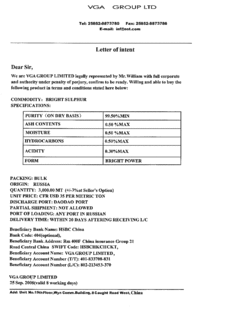A letter of comfort, sometimes called a "letter of intent", is a communication from a party to a contract to the other party that indicates an initial willingness to enter into a contractual obligation absent the elements of a legally enforceable contract. The objective is to create a morally binding but not legally binding assurance. [1]
Generally, a letter of comfort is drafted only in vague terms, to avoid creating enforceable contract terms. [2] Few nations regulate letters of comfort by statute; whether a letter of comfort creates legally enforceable contractual terms is often determined only by courts of law, based solely on the wording of the document. [1] Despite their nonbinding status, letters of comfort nonetheless provide risk mitigation because the parent company is putting its own reputation in jeopardy. [3]
In international contracts, letters of comfort are often used to assure a contracting party that a parent corporation will provide its subsidiary with the necessary resources to fulfill the contract. [2] However, under both international and European Union law, a letter of comfort does not require the parent corporation to fulfill the obligations incurred by its subsidiary. [1] When used to provide support for a subsidiary's actions, a letter of comfort usually consists of three terms: [4]

The European Union (EU) is a political and economic union of 28 member states that are located primarily in Europe. It has an area of 4,475,757 km2 (1,728,099 sq mi) and an estimated population of about 513 million. The EU has developed an internal single market through a standardised system of laws that apply in all member states in those matters, and only those matters, where members have agreed to act as one. EU policies aim to ensure the free movement of people, goods, services and capital within the internal market, enact legislation in justice and home affairs and maintain common policies on trade, agriculture, fisheries and regional development. For travel within the Schengen Area, passport controls have been abolished. A monetary union was established in 1999 and came into full force in 2002 and is composed of 19 EU member states which use the euro currency.
- A statement from the parent organization acknowledging that its subsidiary has entered into a contract.
- A promise that the parent organization will not sever its legal relationship with the subsidiary until contractual terms are satisfied.
- A statement of comfort (e.g., "it is our policy" or "it is our intention") indicating how far the parent organization will go to support the subsidiary in fulfilling its contractual terms.
Canada recognizes two types of letters of comfort. The weaker version, in which a parent organization acknowledges that a subsidiary has entered into a contract but which provides no assurance of intention, is called a letter of awareness. The stronger version, the letter of comfort, indicates the parent organization's intention to support the subsidiary. [5] In the United States, there is a general presumption against the enforceability of letters of comfort. However, depending on the wording of the document, there may be legal liability under the rule of reliance. [6]

Canada is a country in the northern part of North America. Its ten provinces and three territories extend from the Atlantic to the Pacific and northward into the Arctic Ocean, covering 9.98 million square kilometres, making it the world's second-largest country by total area. Canada's southern border with the United States is the world's longest bi-national land border. Its capital is Ottawa, and its three largest metropolitan areas are Toronto, Montreal, and Vancouver. As a whole, Canada is sparsely populated, the majority of its land area being dominated by forest and tundra. Consequently, its population is highly urbanized, with over 80 percent of its inhabitants concentrated in large and medium-sized cities, many near the southern border. Canada's climate varies widely across its vast area, ranging from arctic weather in the north, to hot summers in the southern regions, with four distinct seasons.

Estoppel is a judicial device in common law legal systems whereby a court may prevent, or "estop" a person from making assertions or from going back on his or her word; the person being sanctioned is "estopped". Estoppel may prevent someone from bringing a particular claim, particularly if a promise unsupported by consideration is being relied on by the other party. Legal doctrines of estoppel are based in both common law and equity.
"Letter of comfort" in relation with country to country' "Letter of comfort" is basically a promise, guaranty, or given words, I will stress here on "given words" so a country gives its word of trust as based on mutual trust to another country. It is way more powerful than any others guaranty, it actually bound with faith for any future deal or treaty.it has never been break till date, on the other hand, 100s of guarantees has been fought in international courts.



